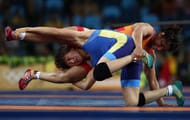This was not supposed to be. Not even the most optimist followers of wrestling in the country saw this coming. A medal was always in the offing, but nobody expected it to be brought by Sakshi Malik, now to be forever known as the first woman Olympic medalist for India – bringer of the 13th individual medal, a bronze – at Rio 2016.
Not till April 2016 could Sakshi have foreseen that she would be competing at the Olympics in Brazil. Impressive rise in the junior circuits notwithstanding, the best 58kg female grappler in the country was undisputedly Geeta Phogat – Commonwealth Games gold medalist and the first Indian woman wrestler to qualify for the Olympics in London.
As Sakshi said days before creating history by improving upon Geeta Phogat’s record and actually winning a bronze medal, her own version of the Olympic dream had been to be able to train with Geeta after the senior 58kg champion had qualified for Rio. Standing at the podium was not her dream; India had the three Phogat sisters for that.
Getting a chance to qualify for Rio under unusual circumstances
But in April 2016, less than four months to the day, things changed drastically. In the Olympic qualifying event in Mongolia, Geeta and her sister Babita Kumari were thought to have brought shame to the country by not appearing for their matches in the repechage rounds despite several announcements. Neither of them had communicated to the organisers that they would not appear, and their act was considered an act of indiscipline, especially since the President of the sport’s international body had been present in the arena.
Both of them explained later that they had been saving themselves up for the next qualifying event in two weeks’ time because they did not stand a chance to qualify from the Mongolia event anyway. However, they were both suspended by the WFI (Wrestling Federation of India) and disallowed from taking part in the final qualifying event which would be held in Istanbul in May.
The suspensions of both Geeta and Babita were both lifted eventually, but while Babita had no real contender in the 53kg category, Sakshi had been waiting in the wings for a while in the 58kg one. Geeta Phogat was overlooked, and Sakshi was named to represent India in Istanbul.
“This chance has come, I won’t let it go. Then I’ll have to wait four more years”, she had said.
Under the Phogat shadow
Over the next three months, Sakshi trained in camps in Bulgaria, Lucknow and Sonepat, for the first time with a realistic aim in mind of showing her craft on the biggest stage of them all. Having trained for a large part of her life at an akhara with boys, where she cycled to and from everyday, Sakshi had never been chosen ahead of Geeta at a big international event before.
In the semi-final of the qualifying event in May, against Lan Zhang, the match that would decide if she had it in her to play for India, she went for the opponent’s legs straight away, surprising everyone with her ferocity. She had always been the underdog, she did not have much to lose – unlike the famed Phogat sisters, legends of the sport in India. She won the bout in sensational fashion, edging it at the last second with the score at 10-10.
When Sportskeeda visited the womens’ wrestling training camp in Lucknow in late May, she had said, “If the Indian people support us, we shall bring back medals. Out of all of us, I think Vinesh has the best chance of doing it.”
True to promise, the women wrestlers have brought a lot of glory to India. Vinesh Phogat was rolling over opponents in the 48kg category till a heartbreaking injury in the quarterfinal ended her campaign on Wednesday. A score of 11-0 going the way of India is not a very common sight on the Olympics stage, but such was Vinesh’s dominance.
Narrow escapes in initial rounds
As for Sakshi, she has been overshadowed by Vinesh even as the Olympics kicked off. She managed to win her matches, but played within her limits, edging low scoring matches 5-4 against Swede Johanna Mattson in the qualifying round and winning by technical points after a tie at 5-5 against Romanian Mariana Cherdivara in the first elimination round. As suggested by the scorelines, she had not reached the frenzied mode that had been on display in the Istanbul semifinal, only managing to win by the skin of her teeth.
From 0-4 down in her first bout, she won 5-4; in her second bout, she was down 0-3 but again managed to come back and win. But the mother of all comebacks she had saved for the main event, the medal match.
In the second elimination round, Sakshi lost 2-9 to Russian Zholobova Koblova. Compounded with Vinesh’s heartbreak, this loss seemed to signal an end of the womens’ medal chances. But as darkness fell on India on Wednesday, things suddenly looked very sunny in Brazil. Koblova progressed to the final, giving Sakshi a chance to fight for bronze in the repechage rounds.
She had to take the roundabout way to glory, but she has never had a straight path anyway.

Up against Mongolian Orkhon Purevdorj, Sakshi took things slowly in the first few minutes but picked up some points in quick succession in the second period. Purevdorj had shown stiff defence at the start, refusing to be pinned down. But she conceded the match after a volley of takedown points were awarded to Sakshi as the end of the 2nd period loomed and the Mongolian went for the attack.
Winning in last 2 seconds – the most incredible Indian Olympic story?
In the bronze medal match, Sakshi was up against Aisuluu Tynybekova of Kyrgyzstan, who seemed to be the toughest opponent yet, barring the Russian finalist. In the first three minutes, Sakshi was thoroughly outplayed. She conceded a one-point penalty for not being able to complete a takedown and then conceded four more by being forced off the mat.
Down 0-5 at the start of the second period, Sakshi had a mountain to climb. But suddenly, she looked like a changed wrestler. The aggression of the Istanbul semi-final was back.
Back pushed to the wall – that’s where Sakshi seems to feel the most comfortable. Being 0-5 down was not the first time she had been the underdog. “You have to fight, fight, fight, if you want to achieve something”, she had told Sportskeeda in Lucknow.
And fight she did. With less than a minute to go, with the tricolour painted on her jersey, Sakshi roared back. She fought for the medal failings which have plagued the Indian contingent so far, for the years spent on the sidelines while her peers were considered to be the nation’s hopes.
In the last minute of the match, she managed two successful takedowns, bringing down the deficit to 1 point. And then, as if a billion prayers had been answered, with two seconds left on the clock, Sakshi pinned Tynybekova to the mat for the third time in the match. The scoreboard had changed within a minute from 0-5 to 7-5. A further one point was awarded as the Kyrgyz grappler made a challenge but the judges turned it down.
The most incredible Olympics story from India in recent years had just been scripted. From being the second best in her country till three months ago, from being overshadowed even in the Olympics, from a deficit of 0-5 down, this 23-year-old Rohtak girl had found it in herself to fight back. Sakshi Malik had clinched the bronze medal with a 8-5 scoreline.
When asked together in Lucknow what they hoped to win at the 2016 Olympics, Vinesh had said she would get a gold for India, but Sakshi had joked that the women wrestlers would get 3 to 4 medals. On being given a quizzical look as to where the extra one medal could come from, the girls had laughed between themselves. Now, maybe we get the joke.
Babita Kumari remains in contention for a medal in the 53 kg category on Thursday, and it suddenly seems that our hopes on the women wrestlers were completely justified all along. For Sakshi the unnoticed, Sakshi the resilient, has turned overnight into a national icon and a major character in the nation’s sports history.

